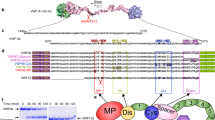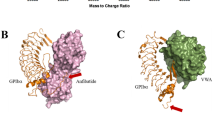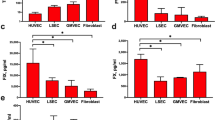Abstract
HAEMOSTASIS and thrombosis are thought to involve a reaction between the blood and the diseased or damaged walls of blood vessels, but little is known about the chemical nature of the process. It is, however, known that collagen, which is present in the walls of blood vessels, will aggregate platelets in vitro1,2 and will also initiate the blood clotting mechanism3,4. These properties of native collagen with an intact triple helical structure are, however, lacking in the denatured random coil form4,5. Furthermore, selective blocking of polar groups on the native collagen molecule specifically inhibits either the ability to aggregate platelets or to initiate clotting. In the light of these and other observations listed in Tables 1 and 2, we wish to propose that rigidly spaced polar groups confer on substances the ability to aggregate platelets or to initiate clotting by activating the Hageman factor.
This is a preview of subscription content, access via your institution
Access options
Subscribe to this journal
Receive 51 print issues and online access
$199.00 per year
only $3.90 per issue
Buy this article
- Purchase on Springer Link
- Instant access to full article PDF
Prices may be subject to local taxes which are calculated during checkout
Similar content being viewed by others
References
Zucker, M. B., and Borrelli, J., Proc. Soc. Exp. Biol. and Med., 109, 779 (1962).
Zucker, M. B., Thromb. Diath. Haemorh., Suppl., 26, 175 (1967).
Niewiarowski, S., Bankowski, E., and Rogowicka, I., Thromb. Diath. Haemorrh., 14, 387 (1965).
Wilner, G. D., Nossel, H. L., and LeRoy, E. C., J. Clin. Invest., (in the press).
Wilner, G. D., Nossel, H. L., and LeRoy, E. C., J. Clin. Invest, (in the press).
Margolis, J., Ann. NY Acad. Sci., 104, 133 (1963).
Ratnoff, D. D., and Crum, J. D., J. Lab. Clin. Med., 63, 359 (1964).
Nossel, H. L., Rubin, H., Drillings, M., and Hsieh, R., J. Clin. Invest., 47, 1172 (1968).
Spaet, T. H., Cintron, J., and Spivack, M., Proc. Soc. Exp. Biol. and Med., 111, 292 (1962).
Schneider, W., Kubler, W., and Gross, R., Thromb. Diath. Haemorrh., 19, 307 (1968).
Haslam, R. J., Nature, 202, 765 (1964).
Gustavson, K. H., Arkiv För Kemi, 17, 541 (1961).
Veis, A., Treatise on Collagen (edit. by Ramachandran, G. N.), 1, 406 (Academic Press, New York, 1967).
Born, G. V. R., Nature, 194, 927 (1962).
Haslam, R. J., Physiology of Hemostasis and Thrombosis (edit. by Johnson, S. A., and Seegers, W. H.), 88 (Thomas, Springfield, Illinois, 1967).
Author information
Authors and Affiliations
Rights and permissions
About this article
Cite this article
NOSSEL, H., WILNER, G. & LEROY, E. Importances of Polar Groups for initiating Blood Coagulation and aggregating Platelets. Nature 221, 75–76 (1969). https://doi.org/10.1038/221075a0
Received:
Revised:
Issue Date:
DOI: https://doi.org/10.1038/221075a0
This article is cited by
-
Rheological study on coagulation of blood with special reference to the triggering mechanism of venous thrombus formation
Journal of Biorheology (2009)
-
Selected topics in biomedical polyurethanes. A review
Colloid & Polymer Science (1989)
-
Effect of phospholipases on Factor-VIII activity
Human Genetics (1978)
-
Biochemische Prozesse bei der Ausl�sung der Blutgerinnung durch Kollagen
Klinische Wochenschrift (1974)
-
Platelet lipids and coagulation in plasma
Irish Journal of Medical Science (1972)
Comments
By submitting a comment you agree to abide by our Terms and Community Guidelines. If you find something abusive or that does not comply with our terms or guidelines please flag it as inappropriate.



